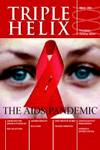Cannabis downgraded
Cannabis will be downgraded to a class C 'non-arrestable' drug on 29 January 2004. The House of Lords approved the move from Class B by 63 votes to 37 on 12 November 2003, putting cannabis in the same category as anabolic steroids, benzodiazepines and the 'date rape' drub GHB. The reform to the Criminal Justice Bill will mean that in most cases police will no longer have the power to arrest users for possession. A last-minute amendment did however acknowledge the fact that the change may 'risk the health of young people'. (Evening Standard 2003; 13 November:14)
Gun crazy
There are currently 639 million small arms in the world, produced by more than 1,135 companies in at least 978 countries: one gun for every 9 people on the planet! Firearms currently kill one person every minute, and eight million new weapons are produced every year, with their proliferation increasing since the September 11 terrorist attacks in 2001. Amnesty International and Oxfam, in their recent report Shattered Lives, have together called for an arms trade treaty by 2006 (like the Landmines Treaty), to prevent arms exports to countries where they are likely to be used 'to commit grave violations of international human rights'. (The Times 2003; 10 October:19)
Plans to stop 'eugenic' abortions
Prolife groups in the UK are proposing to use a clause in the proposed European constitution to mount a legal challenge to the abortion of disabled babies. Each year in Britain about 1,800 babies are aborted after tests show them to have any of 200 conditions including Down's syndrome, spina bifida and muscular dystrophy. The government is committed to signing the constitution, which would take primacy over UK law. It includes a new charter of fundamental rights, which has been declared non-negotiable and requires the 'prohibition of eugenic practices, particularly those aimed at the selection of persons'. (The Times 2003; 29 October:15)
Gay bishop controversy
The consecration of (the openly gay) Gene Robinson as Bishop of Hampshire has heightened fears of schism within the Anglican communion and left the liberal and conservative wings of the church 'in communion with Canterbury, but not with each other'. In a joint statement the primates of the Global South (which takes on most of the Church in Africa, Asia and the West Indies) said, 'We are appalled that the authorities within the Episcopal Church of the US have ignored the heartfelt pleas of the Communion not to proceed with the consecration of Gene Robinson... The consecration of a bishop who divorced his wife and separated from his children and is now living as a non-celibate homosexual, clearly demonstrates that authorities within the Episcopal Church of the US consider that their cultural based agenda is of far greater importance than obedience to the word of God'. The primates account for 50 million of the 77 million members of the Anglican Communion worldwide. The majority of the remainder are British Anglicans who rarely, if ever, attend a church service. (The Times 2003; 4 November:1)
Update to embryology law
The House of Commons Science and Technology Committee has called for the 1990 Human Fertilisation and Embryology Act to be updated to include new 'therapies' such as preimplantation genetic diagnosis, embryo research for therapeutic purposes and issues of consent on frozen embryos. The committee blames the Government for its lack of action on the issue, which has led to the current inquiry. (Hospital Doctor 2003; 20 November:18)
Belgian contraception vouchers
The Belgian government is planning to provide hundreds of thousands of teenagers with monthly vouchers from 1 January next year to help pay for the costs of contraception, in a bid to reduce the number of unwanted pregnancies. Each voucher will be worth three euros, the monthly cost of the second-generation pill and the total cost of the exercise will be 5.29m euros. According to Belgium's most recent statistics some 2,200 abortions were performed on girls between the ages of 13 and 19 years in 2001. (British Medical Journal 2003;327:945 (25 October)
Sperm and egg trading
Last August, the world's first internet sperm bank baby was born to a proud mother and her partner, an Apple Power Mac G4. This iMaculate conception was made possible thanks to British website ManNotIncluded.com (although you can apparently get much cheaper sperm on eBay!) 'The whole procedure is horrible,' said a spokesman for the charity Life: 'Children are far too important to be the result of sperm bought by email'. (The Guardian 2003;22 August) The Human Fertilisation and Embryology Authority (HFEA) is to review the practice of 'egg giving'- whereby a woman seeking in vitro fertilisation firstly goes through one cycle of treatment in which her eggs are harvested and donated to another patient before going on to have another cycle of treatment for herself at reduced cost. London fertility expert Professor Ian Craft, who pioneered the practice, was criticised for the commercial nature of his activity in BBC television's current affairs programme Panorama. Craft maintains that egg giving is not tantamount to trading in eggs, which is illegal in Britain. 'No money changes hands, and both the donor and the recipient get the best possible chance of success in their treatment cycle.' (British Medical Journal 2003; 327:250)
Queen's speech
The government intends to introduce a new Civil Partnership Bill which would enable same sex 'civil partners' to sign a document entitling them to the same rights as married couples. A Human Tissue Bill is intended to tighten up rules on when doctors can and cannot retain dead people's organs and tissue. A draft Identity Cards Bill will create a national register and powers for compulsory ID cards holding biometric data. A total of 23 bills and 7 draft bills included in the 2003 Queen's Speech are expected to come up for parliamentary debate over the next year. (BBC News Website 2003; 26 November)































